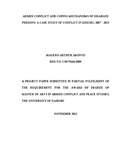| dc.description.abstract | This research focuses on armed conflict and the coping mechanism of disable person in
Kisumu with reference to the Post-Election Violence. It covers the period between 2007
and 2013. The preceding years were useful in building the history of conflicts in Kisumu
City. The goal of this research is to show that the disable are not only victims but can
also be perpetrators in an armed conflict situation. It shows that the disabled persons
develop coping mechanism during and after the armed conflict for this case in Kisumu
City. The main questions addressed in this study are; what circumstances were the
disabled persons in Kisumu perpetrators and victims of the Post-Election Violence
(PEV); how did they cope with the situation during and after the PEV; and what
challenges did they face as disabled persons? In answering this question, the study
addresses three main objectives. It first analyzes the role played by the disabled persons
in Kisumu during the conflict. Second, it analyzes the coping mechanisms that the
disabled persons developed during and aftermath of 2007/8 PEV. Third, it assesses the
challenges faced by the disabled persons in Kisumu on their coping mechanisms. The
study was carried out in Kisumu City and it tests three hypothesis, first that the disabled
persons in Kisumu were victims as well as perpetrators; secondly that the disabled
persons in Kisumu developed some coping mechanisms after the 2007/8 Post-Election
Violence and thirdly that the Post-Election Violence 2007/8 had devastating impacts on
the disabled persons in Kisumu. To analyze and assess the coping mechanisms which
disabled persons developed during and after the PEV, this study uses both primary and
secondary sources. It has applied the basic human needs theory which represents social
construct that cannot be empirically measured and is associated to outbreak of conflict or
harmonious coexistence among a group of persons. As comprehended in this study that
disabled persons in Kisumu who were affected by PEV developed different coping
mechanism during and after the violence. The mechanisms were meant for them to
survive the violence and its aftermath. These coping mechanisms range from i.) Spying,
ii.) Incitement, iii.) Seeking support from the community and iv.) Personal strategies
during the Violence. After the violence, coping mechanism range from: i.) livelihood
approach, ii.) Turning to faith, iii.) Counseling, iv.) Involvement in small business, v.)
Community support, vi.) Assurance from the security agents, vii.) Begging on the streets,
viii.) Peace preacher and ix.) Personal strategies. This study reckons that most of the
disabled persons faced challenges a | en_US |

